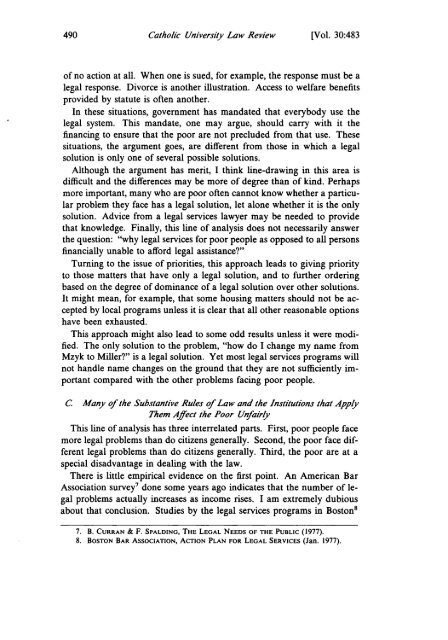Law for The Poor
Law for The Poor
Law for The Poor
You also want an ePaper? Increase the reach of your titles
YUMPU automatically turns print PDFs into web optimized ePapers that Google loves.
Catholic University <strong>Law</strong> Review<br />
[Vol. 30:483<br />
of no action at all. When one is sued, <strong>for</strong> example, the response must be a<br />
legal response. Divorce is another illustration. Access to welfare benefits<br />
provided by statute is often another.<br />
In these situations, government has mandated that everybody use the<br />
legal system. This mandate, one may argue, should carry with it the<br />
financing to ensure that the poor are not precluded from that use. <strong>The</strong>se<br />
situations, the argument goes, are different from those in which a legal<br />
solution is only one of several possible solutions.<br />
Although the argument has merit, I think line-drawing in this area is<br />
difficult and the differences may be more of degree than of kind. Perhaps<br />
more important, many who are poor often cannot know whether a particular<br />
problem they face has a legal solution, let alone whether it is the only<br />
solution. Advice from a legal services lawyer may be needed to provide<br />
that knowledge. Finally, this line of analysis does not necessarily answer<br />
the question: "why legal services <strong>for</strong> poor people as opposed to all persons<br />
financially unable to af<strong>for</strong>d legal assistance?"<br />
Turning to the issue of priorities, this approach leads to giving priority<br />
to those matters that have only a legal solution, and to further ordering<br />
based on the degree of dominance of a legal solution over other solutions.<br />
It might mean, <strong>for</strong> example, that some housing matters should not be accepted<br />
by local programs unless it is clear that all other reasonable options<br />
have been exhausted.<br />
This approach might also lead to some odd results unless it were modified.<br />
<strong>The</strong> only solution to the problem, "how do I change my name from<br />
Mzyk to Miller?" is a legal solution. Yet most legal services programs will<br />
not handle name changes on the ground that they are not sufficiently important<br />
compared with the other problems facing poor people.<br />
C Many of the Substantive Rules of <strong>Law</strong> and the Institutions that Apply<br />
<strong>The</strong>m Affect the <strong>Poor</strong> Unfairly<br />
This line of analysis has three interrelated parts. First, poor people face<br />
more legal problems than do citizens generally. Second, the poor face different<br />
legal problems than do citizens generally. Third, the poor are at a<br />
special disadvantage in dealing with the law.<br />
<strong>The</strong>re is little empirical evidence on the first point. An American Bar<br />
Association survey 7 done some years ago indicates that the number of legal<br />
problems actually increases as income rises. I am extremely dubious<br />
about that conclusion. Studies by the legal services programs in Boston 8<br />
7. B. CURRAN & F. SPALDING, THE LEGAL NEEDS OF THE PUBLIC (1977).<br />
8. BOSTON BAR ASSOCIATION, ACTION PLAN FOR LEGAL SERVICES (Jan. 1977).

















